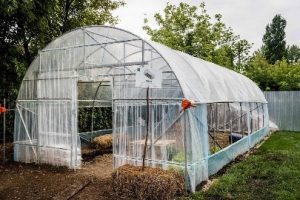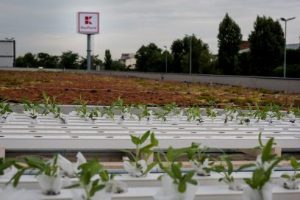Anywhere in the world, this seems a situation at odds with business interests, especially with a large discount chain that sells groceries. Yet, six Kaufland stores in Romania will have a community garden at (or near) the location before the end of 2017. And that’s just the first phase of their new Gradinescu garden building project.
Society and the environment are hugely important to this German company’s Romania division. They’re an active participant in afforestation and sustainability and environmental education and also keen supporters of projects that help the disadvantaged. Community gardens fit neatly into the Kaufland Romania views on their responsibilities to society and the environment.
Of the 103 discount hypermarket stores in Romania, Kaufland chose select locations around Bucharest. A different type of garden will exist in each location, and most of the garden installations have two phases. No doubt to allow them to weigh the neighborhood response to each, and the merits and success of the different kinds of sustainable gardening before moving forward in expanding the urban garden program.
 The first community garden opened a few weeks ago at their Bucharestii Noi store, featuring adopt-a-plot beds for the neighborhood to grow food, flowers, and herbs. Those interested in learning to grow food will have the advantage of guidance from permaculture specialists, who will also use part of the 2300 m2 garden for teaching area school children the ins and outs of sustainable growing. They’ve also installed a small hydroponic gardening system on the roof of this store. If the test crops go well, a rooftop garden expansion will follow.
The first community garden opened a few weeks ago at their Bucharestii Noi store, featuring adopt-a-plot beds for the neighborhood to grow food, flowers, and herbs. Those interested in learning to grow food will have the advantage of guidance from permaculture specialists, who will also use part of the 2300 m2 garden for teaching area school children the ins and outs of sustainable growing. They’ve also installed a small hydroponic gardening system on the roof of this store. If the test crops go well, a rooftop garden expansion will follow.
There is more to each community garden than growing. With a playground area, WiFi-equipped working space, and movie and event space in each one, it is clear that project staff realizes that these urban green spaces offer the neighborhood many-faceted benefits. They’ve also included some excellent environmental components in each garden’s plans; insect hotels, composting, water mesh, and solar power.
The Gradina Pe Acoperis at their Tudor Vladimirescu location features an experimental 200 m2 hydroponic garden under cover to produce herbs, baby veggies, and greens in phase one, and a geodesic greenhouse in phase two. The phase one garden at their Barbu Vacarescu location features a 1200 m2 edible landscape food forest and blooming meadow the neighborhood can adopt and interact with. Phase two here offers terraces of vegetable beds and sensory plantings.
 The community garden at Aparatorii Patriei is a collaborative installation working with those living in neighboring homes featuring a 400 m2 fenced garden for growing food and beauty.
The community garden at Aparatorii Patriei is a collaborative installation working with those living in neighboring homes featuring a 400 m2 fenced garden for growing food and beauty.
Also included in this first round of Gradinescu installations are two schools in the south end of Bucharest, where the outdoor classrooms offer a 500 m2 garden with rainwater collection, composting and more sustainable growing inclusions.
Kaufland Romania is investing 300,000 Euros (over $354,000 USD) in the their initial urban garden installations (phase one and two). These are the first community gardens in Romania too, and the result of a survey the company conducted with its customers. There are over 3,000 plants already installed in phase one of the Bucharestii Noi green space, just waiting for the neighbors to tend them. Note that this is not an international program across the chain, it exists only in Romania.